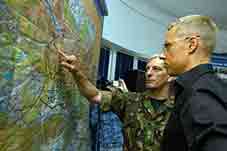Georgia winning the war of friendly faces
By Mikheil Svanidze
Friday, August 22

Stubb visited the city of Gori, which is currently under the control of the Russian military. Stubb said he had received a promise from the Russian commanders that they would leave the city within 24 hours. “I cannot control whether they will actually pull out [from Gori] or not. Right now, I can’t see any signs [of the pullout], but let us hope that the Russian side will keep its promise,” Stubb said.
The OCSE has decided to raise the number of its observers in the conflict zone of South Ossetia to one hundred. Tbilisi has welcomed this, but the Russian side has been hesitant to let the observers in. All sides have agreed, however, to deploy twenty additional observers to “areas adjacent to South Ossetia.” Alexander Stubb said OSCE would “gradually raise” the number of observers. Prior to the outbreak of hostilities, OSCE had eight unarmed observers on the ground.
Russian military officials have accused OSCE of knowingly concealing the start of the “Georgian aggression” in Ossetia. “From the beginning of the conflict, there have been complaints about OSCE. They were informed by the Georgian side that there would be an intrusion, but [they] did not inform Russian peacekeepers,” Deputy Chief of the Russian General Staff Anatoly Nogovitsyn said yesterday at a briefing. But OSCE officials denied the claim. “Neither the OSCE headquarters, nor the OSCE mission in Georgia had any information of the intention of the sides to use military force,” news agency Interfax quoted OSCE spokesman Mikhail Evstafyev as saying.
Senior US military commander Bantz J. Craddock visited Georgia yesterday as well, holding a joint briefing with President Saakashvili. The Georgian President noted the need to “coordinate [response to] the humanitarian disaster” in Georgia. Two U.S. Navy ships, a guided missile destroyer USS McFaul, and a Coastguard vessel were reportedly expected to arrive in Georgia within a week, carrying humanitarian aid for the civilian population which has suffered during the conflict. President Saakashvili reiterated he would continue to co-operate with United States in strengthening the Georgian Army.
President of Romania Traian Basescu also visited Tbilisi yesterday, stressing his support for Georgia’a NATO aspirations and reiterating his support for the country in its Euro-Atlantic integration efforts. Basescu also emphasized the importance of the security of the Black Sea region, which both Romania and Georgia are a part of. Robert Simmons, NATO Special Envoy to Georgia was also in Tbilisi and reiterated NATO’s support for Georgia’s sovereignty and territorial integrity. Simmons met Speaker of the Georgian Parliament Davit Bakradze to discuss the details of the work of the NATO-Georgia Commission, the establishment of which was agreed on August 19th.
“The NATO-Georgia commission will continue to work towards the implementation of the Bucharest agreement and help the continuation of the political dialogue,” Simmons said yesterday. At the Bucharest NATO summit in April, Georgia was denied a Membership Action Plan (MAP), but was promised eventual membership.
